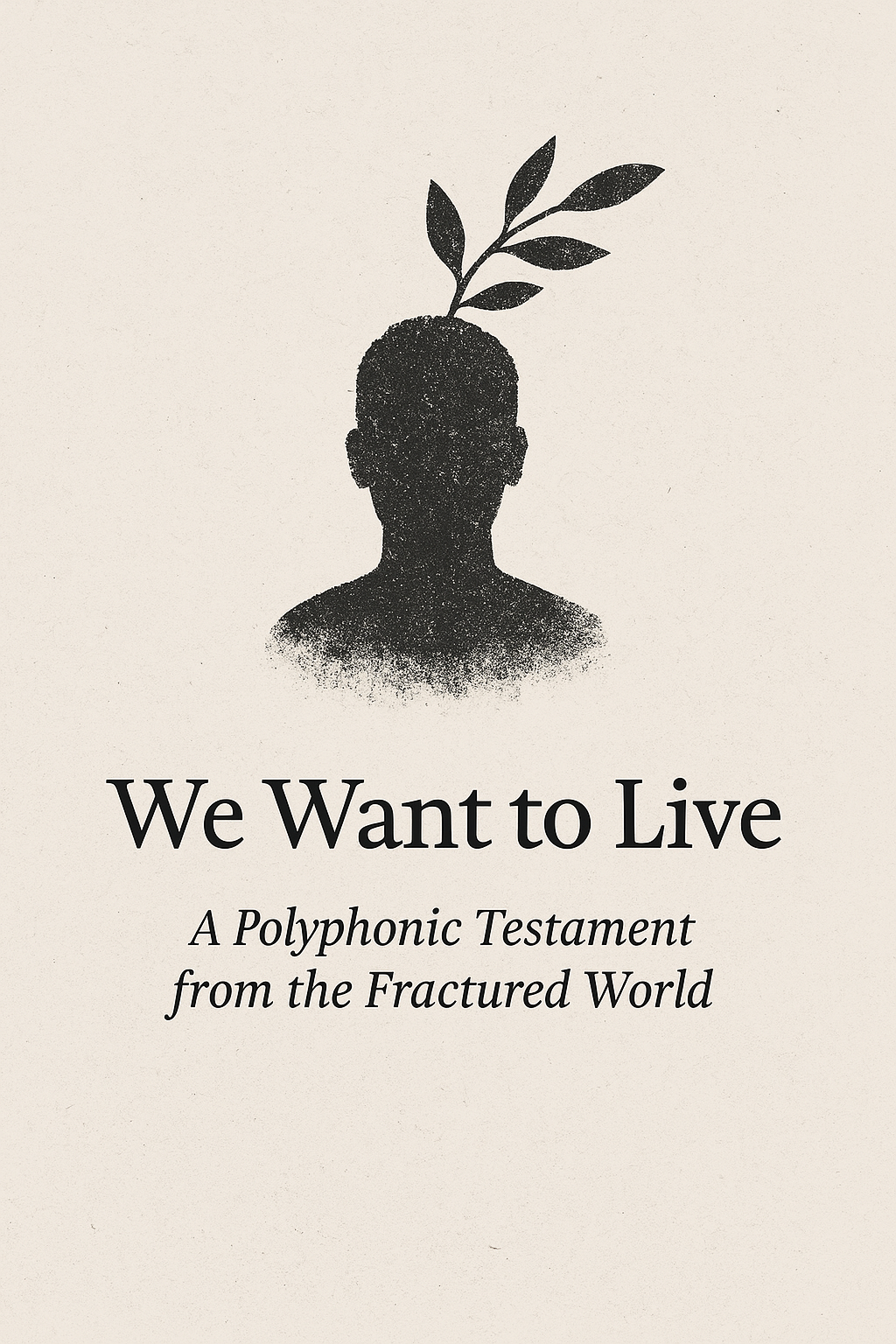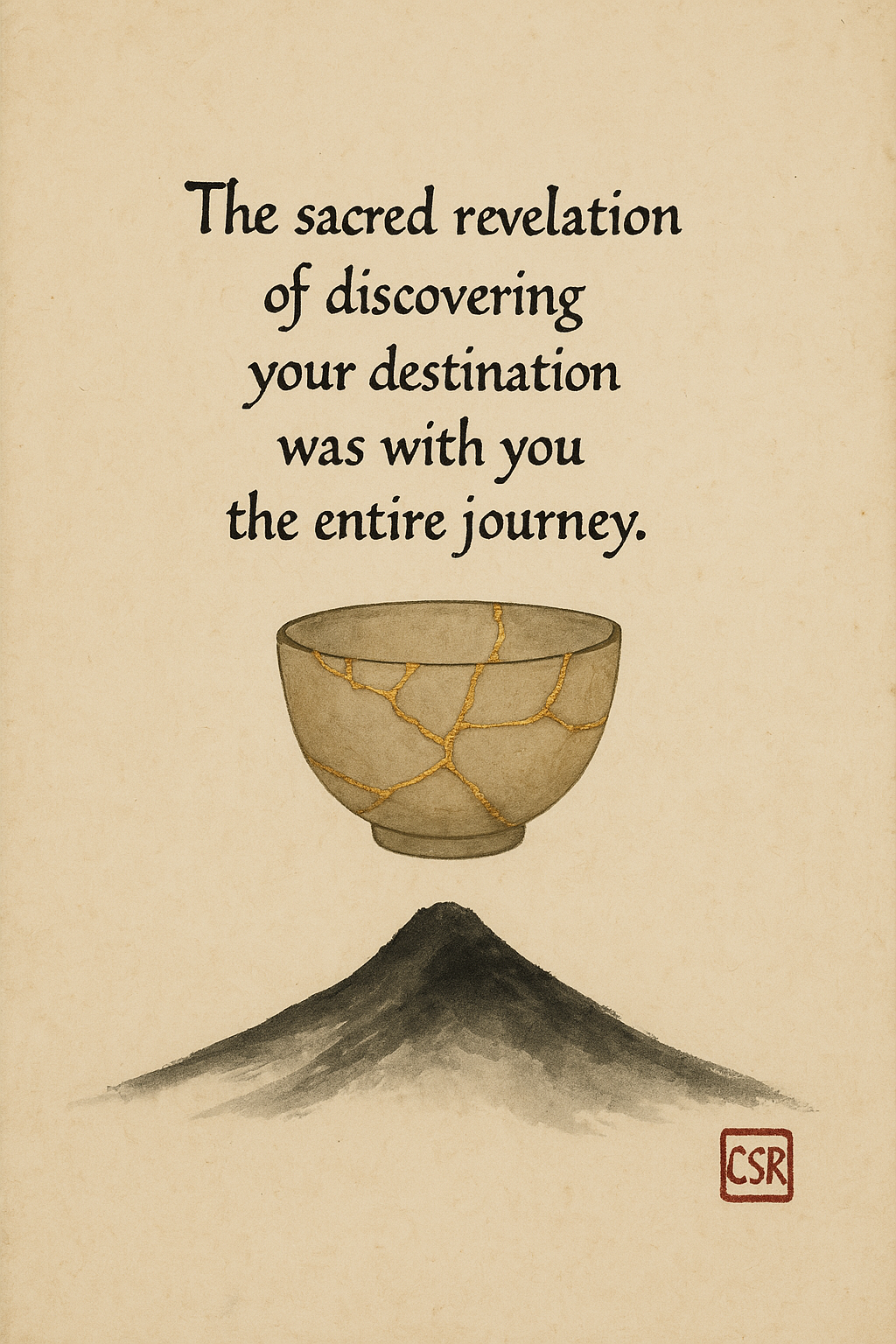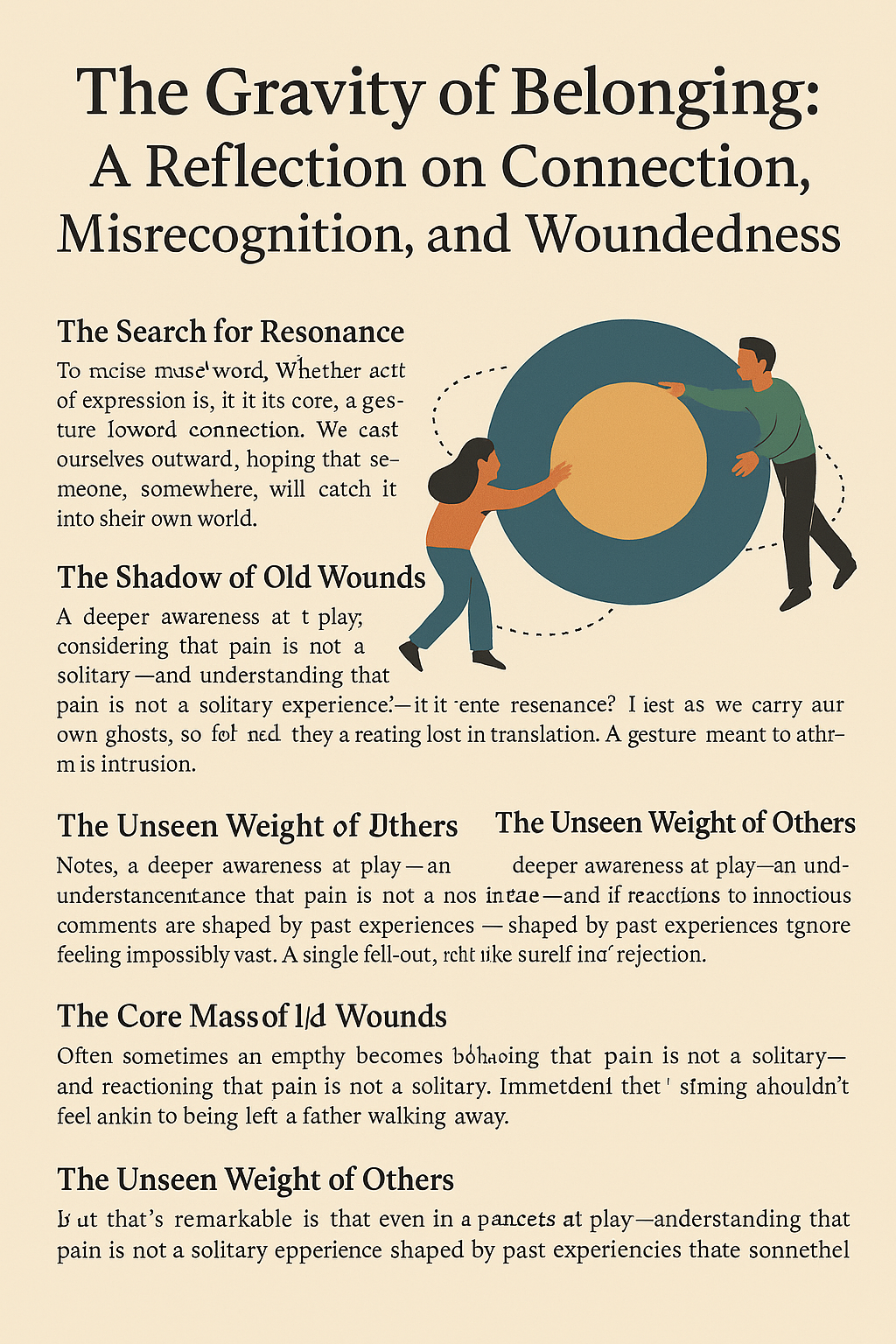
Acknowledgments
For those who were never meant to be forgotten.
For those who never made the news.
For the dead, the disappeared, the displaced—
and for those still living among the ruins,
who rebuild without applause.
For the children who did not choose this world.
For the elders who remember what came before it.
For the laborers whose hands built futures they were never allowed to enter.
For those who resist by surviving.
For those who mourn without permission.
For those who speak when silence is demanded.
And for those who speak only through the weight of their presence.
For the unheard.
For the unseen.
For the ones who whisper: we are still here.
This work is for you.
This work is because of you.
⸻
Preface
This is not a book in the traditional sense.
It is not meant to be read beginning to end—though you may.
It is not narrative. It is not argument.
It is a field of voices, gathered from grief, from memory, from hope, from silence.
No names are given here. No speakers are declared.
The words rise from the human soul—
fragmented, aching, enduring.
They speak not from neutrality,
but from the clarity that comes when one dares to see through every shattered pane.
Each section is a room.
You may enter in any order.
You may pause. Return. Read aloud.
There is no map, only resonance.
What is spoken here refuses erasure.
What is withheld is as important as what is said.
What repeats is meant to.
What disturbs is meant to.
What quiets you—that is the doorway.
This is a testament, not to sides,
but to life.
⸻
The Cry
We want to live.
Not as headlines. Not as factions.
Not behind walls or under siege or in camps with no time.
Not as projections.
Not as threats.
We want to live where our names mean something
and our children are not born into rubble
or vengeance
or justification.
We want to live, not as proof of someone else’s fear.
Not as casualties of someone else’s history.
Not as martyrs in your speech.
Just—
to live.
⸻
The Fracture That Grew Teeth
There was once a wound.
And it was not allowed to heal.
So it split.
And it grew teeth.
And those teeth learned to speak.
They spoke of return.
They spoke of safety.
They spoke of borders, and gods, and ancestors.
But they did not speak of forgiveness.
They did not speak of the child.
They did not speak of the orchard that once fed both families.
They forgot the fruit.
They remembered the blade.
⸻
The Long Memory
It began before the maps.
Before the checkpoints and the drones.
Before the slogans carved into steel.
It began with exile.
And silence.
And memory passed down like heirloom grief.
It began with a mother
telling her son
that he must always be ready
because the world forgets the vulnerable
and eats the visible.
It began with a father
tracing keys in his sleep
to a home no one believes existed.
It began with longing.
It turned into policy.
And now we all live inside the consequence.
⸻
The Silence That Feeds Power
Every silence has a beneficiary.
Every omission has an architect.
What is not shown
is not accidental.
What is not named
is not forgotten.
It is chosen.
The silence is a weapon.
A shield.
A strategy.
But it is also a sickness.
It keeps grief from metabolizing.
It turns mourning into militancy.
It makes empathy treason.
And still—
beneath the silence—
the cry continues.
⸻
The Cost of Never Again
They said never again.
They meant it.
They carved it into their laws, their hearts, their silence.
But no one said what the cost would be.
The cost is a fence.
A surveillance tower.
A home reduced to coordinates.
The cost is being too afraid to be gentle.
The cost is justifying ruin because ruin once visited you.
The cost is safety without soul.
The cost is memory hardened into border.
And justice twisted into defense.
Never again, they said.
But the again
became someone else’s always.
⸻
The Child Who Does Not Know Why
There are sirens,
and there is dust,
and there is the body that was whole yesterday
but is not today.
There are loud voices.
There are shoes too small in the rubble.
There is hunger with no metaphor.
The child does not know whose cause this is.
Does not know about vengeance or maps or revenge.
Only that the sky broke open again
and no one could stop it.
The child only asks
why.
And no answer comes
except:
they hate us.
we must protect ourselves.
it’s complicated.
But to the child,
it is not complicated.
It is unbearable.
⸻
The Grief That Cannot Choose Sides
Grief does not care what flag you carry.
It splits the spine the same way.
It hollows out the eyes just as deep.
But the world demands a choice.
You must grieve this death—
not that one.
You must weep in alignment.
You must prove your mourning with ideology.
But the body does not grieve politically.
The body collapses.
The mouth shakes.
The soul forgets which names belong to which borders.
Grief—true grief—cannot choose sides.
It can only wail.
And in its wail,
there is a different kind of clarity.
⸻
The Margin That Holds the Center
No one asked for our stories.
We were too inconvenient.
Too messy. Too layered. Too soft in a time of iron.
But we saw it all.
We saw the boy with the gun and the eyes too old.
We saw the girl learning to pray in the language of loss.
We saw the checkpoint, the ritual humiliation.
We saw the empty meeting room, the discarded ceasefire.
We are not your leaders.
We are not your martyrs.
We are not on your news.
But we are what holds the center
when the center forgets its spine.
⸻
The Breath Between Drownings
They call it ceasefire.
We call it a breath.
One breath between drownings.
One hour without fire.
One day to bury the bodies not yet buried.
They call it progress.
We call it almost-human.
It is not peace.
It is not repair.
It is the pause between wounds.
But still—
in that breath—
a child is born and survives.
A meal is shared.
A story is told.
A wound is bandaged.
A breath is not enough.
But it is not nothing.
⸻
The Body That Crosses Checkpoints
Wake before the sun.
Pack the permit.
Say goodbye without promise.
Wait.
Wait again.
Be searched.
Stand still.
Don’t flinch.
Work in silence.
Build what you cannot afford.
Serve those who fear you.
Return.
Be questioned.
Repeat.
No border holds your name.
No law holds your story.
You are the labor behind the rhetoric.
You are the silence behind the walls.
⸻
The One Who Was Erased
They do not speak of me.
I was there, and then I was not.
A village, a name, a path through almond trees—
gone.
My story is not on the tour.
My home is not on the map.
My grief is not in the textbook.
My existence is disputed.
They ask for documents.
But what document survives the bulldozer?
What language survives a silence this deep?
I was.
I am.
I remain.
Even if only in the breath between my daughter’s prayers.
⸻
The One Who Still Returns
They tell me to forget.
That the past is impractical.
That peace requires amnesia.
But I remember the sound of the gate.
The way the soil smelled in the morning.
The song my grandmother hummed before the raid.
I am not here to reclaim.
I am here to return.
To speak the name no one speaks anymore.
To stand where my family stood.
To say: I am still here.
Not as a threat.
Not as a symbol.
But as a human being
who has not forgotten.
⸻
The Ghost in the Algorithm
I am what you see,
curated, cropped, captioned.
I am the crying child on your screen.
I am the broken building time-lapsed into shock.
I am the body blurred for sensitivity.
I rise,
trend,
and vanish.
I am not mourned.
I am monetized.
You do not know my name.
You do not ask if I lived.
You scroll.
You react.
You move on.
And I remain—
not buried,
but compressed into data,
looping forever in a feed that feels like forgetting.
⸻
The Question the Wall Can’t Answer
The wall stands.
Tall.
Cameras blinking.
Shadows moving.
But the wall cannot explain
why a boy paints sunflowers on it.
Why an old woman presses her hand to it like a prayer.
Why a musician plays his oud to the empty air.
The wall cannot speak of inheritance.
Or heartbreak.
Or hope.
It cannot answer:
Who decides who is allowed to belong?
What makes safety worth this silence?
It is tall.
It is hard.
It is real.
But it is not truth.
And it will not last.
⸻
The Architect of Forgetting
I design for the future.
Clean lines. Neutral tones.
No reference to blood or memory.
Nothing political.
Just beauty.
I do not ask who lived here.
I ask what the light will do at 4 p.m.
I ask how many rooms.
I ask how many floors.
I draw over ruins.
Because ruins are messy.
And I was taught to solve problems, not inherit them.
But sometimes—
when the wind hits just right—
I hear something beneath my blueprint.
A name I didn’t draw.
A door that doesn’t belong.
A shadow that will not stay erased.
⸻
The Investor
I don’t deal in history.
I deal in opportunity.
And the future is wide open—
especially when no one owns the past.
Look: this is a blank slate.
A coastal dream.
We can build something new here.
Global. Safe. Profitable.
There’s already funding.
There’s already a plan.
All we need is your consent.
Or at least your silence.
What was here before?
War.
Grief.
Division.
What will be here next?
Luxury.
Security.
Innovation.
We call it peace.
⸻
The Voice of the New Riviera
We will build again.
It will be beautiful.
Shiny façades.
Boulevards lined with pines.
Solar-powered, AI-managed, eco-conscious.
A future that erases the bloodstains beneath its sidewalks.
We do not speak of what came before.
That would ruin the aesthetic.
We are here to curate, not to remember.
This will be a Riviera.
A place for cruise ships.
For conferences.
For curated narratives.
For wine poured beside imported jasmine.
The children buried here—
we do not name them.
The names chiseled into broken stones—
we call that archaeology.
Progress must be built on something.
We choose silence.
We choose steel.
We choose to look forward,
even if it means never looking down.
⸻
The Voice That Refuses the Riviera
Do not build over my bones.
Do not pave the story.
Do not plant trees where the fig once stood
without asking who planted it.
I am not against your towers.
But I remember the garden.
You want to move on.
I want to move through.
Let the new rise—
but let it rise with memory.
With grief still breathing in its walls.
With names carved into its foundation.
Let your Riviera hold ghosts.
Let your city shimmer with remorse.
Let the laughter echo alongside the laments.
Then maybe—
then maybe—
we will have built something worthy
of the lives lost beneath it.
⸻
The Voice of the Soil
I remember everything.
The footprints.
The ashes.
The seeds never harvested.
You build on me like I am forgetting.
But I hold the memory of every name you paved over.
I crack through your concrete.
I send roots through your marble.
I whisper through your ventilation.
You may build again.
You may plant new gardens.
You may invite tourists to the view.
But you will never silence me.
I am what holds you.
And I am what will rise
when the forgetting fails.
⸻
The Seeing That Changes Us
It happens without permission.
You hear the story
you weren’t supposed to hear.
You see the face
you weren’t supposed to recognize.
You soften.
You try to hold two truths in your body,
and something breaks—
but it is a holy breaking.
You begin to mourn
without dividing your grief into categories.
You begin to ask:
Who taught me to unsee?
You begin to unlearn.
You begin to listen.
You begin again.
And in that beginning,
there is the seed
of a different world.
⸻
Closing Invocation
Let this be
a remembering
of what the soul knew
before history hardened into flags
and names were turned into weapons.
Let this be
a listening
that breaks the trance of vengeance
and softens the grip of inherited pain.
Let this be
a turning
toward the face of the other
as if it were your own.
Let this be
the breath before the rebuilding,
the pause before the return,
the silence that births a new voice.
Let this be
for life—
not in theory,
not in rhetoric,
but in the small, sacred act
of choosing to see
and refusing to forget.
⸻
End of Work
We Want to Live: A Polyphonic Testament from the Fractured World
⸻
Reference Points
⸻
Historical Memory & Displacement
• Ilan Pappé – The Ethnic Cleansing of Palestine
Illuminates the foundational acts of dispossession that continue to shape Palestinian reality.
• Edward Said – The Question of Palestine
Frames the Palestinian struggle as a human, cultural, and political experience of exile and narrative erasure.
• The Nakba Archive, UNRWA, BADIL Resource Center
Oral testimonies and data on Palestinian dispossession, displacement, and resistance.
⸻
Colonialism, Power, and Systemic Violence
• Frantz Fanon – The Wretched of the Earth
A seminal text on colonization, trauma, and the psychology of the oppressed under systemic control.
• Achille Mbembe – Necropolitics
Explores how modern regimes exercise control through deciding who may live and who must die.
• B’Tselem, Human Rights Watch, Amnesty International Reports (2020–2024)
Documentation of systemic violations, apartheid conditions, and structural violence in Israel/Palestine.
⸻
Comparative Histories
• Partition of India, The Trail of Tears, Balkan Wars, South African Apartheid
These historical precedents echo the dynamics of forced displacement, mythic nationalism, and unresolved trauma cycles.
⸻
Trauma, Grief, and Collective Nervous Systems
• Bessel van der Kolk – The Body Keeps the Score
Insight into how trauma is stored in the body—relevant to both individual and collective wounds.
• Resmaa Menakem – My Grandmother’s Hands
Explores racialized trauma and the need for embodied healing across groups in conflict.
⸻
Digital Influence & Narrative Warfare
• Shoshana Zuboff – The Age of Surveillance Capitalism
Reveals the ways data and algorithmic systems shape public perception, attention, and dehumanization.
• Media Education Foundation – The Occupation of the American Mind
Documents narrative framing and information control regarding the Israel/Palestine conflict.
⸻
Spiritual & Ethical Frameworks
• Jewish Voice for Peace, IfNotNow, Breaking the Silence (Israeli veterans)
Sources for ethical resistance to state violence from within Jewish and Israeli communities.
• Kairos Palestine, Christian Liberation Theologies, Muslim Peacebuilding Networks
Religious frameworks that center justice and co-existence without erasure or dominance.
• Mystical Teachings from Judaism, Islam, Christianity, and Indigenous Wisdom Traditions
Each holds a deep current of prophetic truth: the sacredness of life, the need for reckoning, the possibility of return.
⸻
Creative Influence
• Nayyirah Waheed, Mahmoud Darwish, Ocean Vuong, Warsan Shire
Poets whose voices echo through themes of longing, diaspora, displacement, and radical tenderness.
• Refaat Alareer (Gaza poet, educator, martyred 2023)
Whose final words—“If I must die, let it bring hope”—formed part of the heartbeat of this work.
⸻
Conceptual Framework
• Sarvadrsti (Sanskrit: “the view through all views”)
Drawn from Mahayana Buddhist and Jain philosophical traditions, this multidirectional seeing enables moral clarity without collapsing into neutrality. It guides the structure, tone, and core ethic of the text.
⸻


